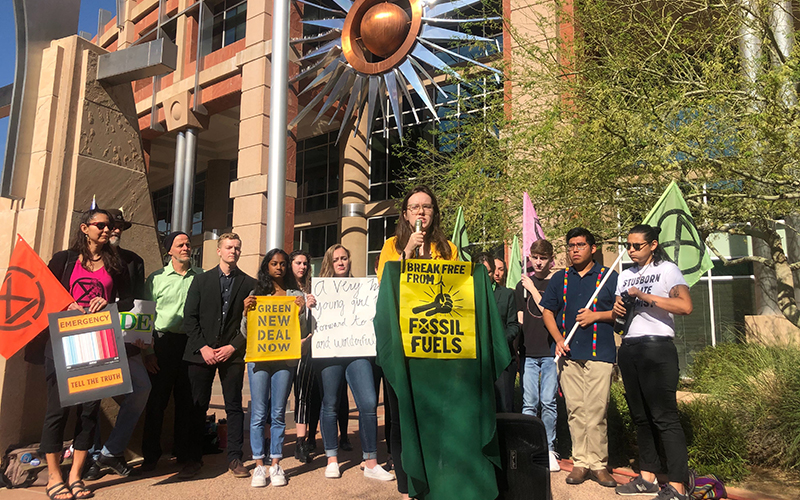
“I’m here to strike against climate change,” said Andrew Bletka, 13, who was among thousands of young Arizonans who marched to demand climate action in September. (Photo by Annika Tomlin/Cronkite News)
PHOENIX – The Environmental Plan proposed by Republican lawmakers looks to make permanent tax breaks for companies that reduce emissions through carbon capture and other means. The updated proposal, co-sponsored by Rep. David Schweikert of Arizona, comes as more Arizonans are calling for greater action on climate change.
Last week, youth activists gathered in front of Phoenix City Hall demanding the city declare a climate emergency and set a deadline of 2030 for Phoenix to become carbon neutral. Larger protests were held in Arizona in September around the U.N 2019 Climate Action Summit.
Over the past nine months, climate change has been given more attention nationally than ever before – thanks, in part, to November’s presidential election. National news outlets have peppered their coverage of the Democratic primary process with “climate crisis” town halls and forums.
At their debate on Sunday, candidates Joe Biden and Bernie Sanders both called the climate crisis the single biggest threat to national security, with Sanders adding that the crisis actually is about health.
But fighting the crisis won’t come cheap. Sanders’ plan has a price tag of $16 trillion.
Phoenix set long-term goals for sustainability four years ago, with officials focusing on 2024.
“Our biggest challenges are smoke, dust, ozone,” said Misael Cabrera, director of the Arizona Department of Environmental Quality.
Phoenix has until 2024 to reduce ozone levels or the federal government will downgrade the city’s air quality to “serious” from “moderate,” triggering new federal regulations on development.
That would be a huge blow for Phoenix, Cabrera said: “We’re estimating an impact of $250 million per year on job creators and businesses.”
Proposed federal legislation is looking to address this financial consequence of climate change. Schweikert, R-Fountain Hills, is co-author of a plan he says would incentivize businesses to reduce air pollution through tax breaks “so we can maximize clean energy production at really affordable prices.”
His proposal is part of the U.S. House GOP Environmental Plan. In it, tax breaks already in effect would be made permanent for businesses that reduce carbon emissions and purchase upgraded equipment with technology to capture carbon emissions from the atmosphere.
“Embracing this technology and incentivizing it – I think now it has sort of entered everyone’s consciousness, so it’s moving forward,” Schweikert said.
He’s talking about direct-air capture — a process of removing CO2 from the air.
Alan Hatton, a professor of chemical engineering at Massachusetts Institute of Technology, has another way of describing it: a way to atone for past transgressions.
“My concern with the legislation and that of my colleagues as well is that we’re just trying to punt the ball down the road a little,” Hatton said. “We’re putting up a bit of a smoke screen because by emphasizing direct air capture, you’re avoiding the real issues associated with fossil fuel emissions.”
But direct-air capture may be necessary in a world that still must use fossil fuels, he said.
“It’s a very expensive process, but I think if you get the right policies in place and the right carbon pricing, et cetera, we should be able to justify the expenditure on doing this,” Hatton said.
Direct-air capture removes carbon dioxide, CO2, from ambient air to reuse or bury deep underground. Hatton favors a process called “point of source” capture, where the business – such as microchip makers and aircraft parts manufacturers – captures emissions before they’re released into the air.
“I think our future depends on it, at least our children’s future,” said Hatton, whose MIT lab spun off a company that’s working to reduce the energy costs of carbon capture.
The problem for business has been the cost. Carbon capture, whether from the air or from the point of source, is very expensive. That’s because the fuel used to power the technology that removes emissions is expensive, Hatton said, but that also is changing.
“We think the costs can be quite low relative to some of the other costs associated with other processes,” Hatton said, referring to processes that use fossil fuels. “Fossil fuels are going to be around for a long time. There’s no denying that. And we need to find ways to mitigate the CO2 emissions from these fossil fuels.”
Hatton and a colleague have found a way to capture emissions and eliminate the CO2 using renewable energy sources, which makes the process cheaper – up to 80% cheaper, according to initial estimates.
And that may make any legislation focused on tax breaks unnecessary, but the science takes time.
Brian Baynes is co-founder of Verdox, the startup spun off Hatton’s MIT lab.
“The energy cost of capturing carbon has been the main limitation that’s kept it from being a scalable technology today,” he said. “That’s why this problem still exists, is that it just fundamentally takes too much energy with the conventional technologies to capture CO2 or capture carbon from the atmosphere.”
Baynes also said legislation offering incentives or tax breaks doesn’t entice companies when developing and funding carbon capture technology will take much longer.
“So if our policy decisions are being made on a time scale of two years or four years, changing and going back and forth, that’s just not really compatible with the time scale of one of these company’s lifetimes,” he said. “We hope to avoid that entirely by trying to serve other markets that may not rely on policy.”
Schweikert, who represents Arizona’s 6th Congressional District, said the key is getting businesses to opt in, which also takes time.
“They would need a longer window, so we’ve actually updated the legislation to make it functionally permanent in the tax code,” he said.
Lawmakers have met with scientists and the companies that back them, Schweikert said, encouraging them to take corporate responsibility for the climate problem.
The key for the legislation, and for the technology, is to make it affordable, he said.
